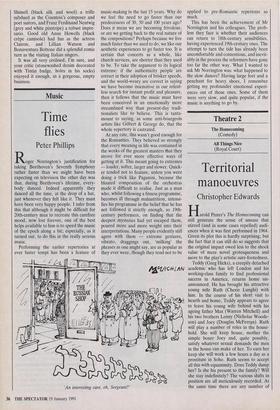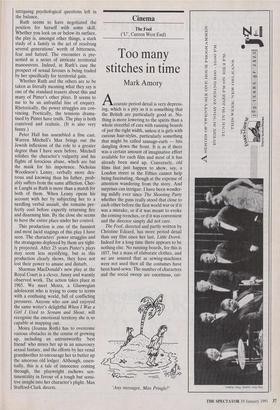Theatre 2
The Homecoming (Comedy) All Things Nice (Royal Court)
Territorial manoeuvres
Christopher Edwards
Harold Pinter's The Homecoming can still generate the sense of unease that stirred (and in some cases repelled) audi- ences when it was first performed in 1964. Given its plot this is hardly surprising; but the fact that it can still do so suggests that the original impact owed less to the shock value of mere novel grotesqueness and more to the play's artistic sure-footedness.
Teddy (Greg Hicks), a creepily detached academic who has left London and his working-class family to find professional success in America, returns home un- announced. He has brought his attractive young wife Ruth (Cherie Lunghi) with him. In the course of his short visit to hearth and home, Teddy appears to agree to leave his young wife behind with his ageing father Max (Warren Mitchell) and his two brothers Lenny (Nicholas Woode- son) and Joey (Douglas McFerran). Ruth will play a number of roles in the house- hold. She will keep house, mother the simple boxer Joey and, quite possibly, satisfy whatever sexual demands the men in the house can make of her. To earn her keep she will work a few hours a day as a prostitute in Soho. Ruth seems to accept all this with equanimity. Does Teddy dump her? Is she his present to the family? Will she stay indefinitely? The various shifts in position are all meticulously recorded. At the same time there are any number of intriguing psychological questions left in the balance.
Ruth seems to have negotiated the position for herself with some skill. Whether you look on or below its surface, the play is, amongst other things, a stark study of a family in the act of resolving several generations' worth of bitterness, fear and hatred. The encounter is pre- sented as a series of intricate territorial manoeuvres. Indeed, in Ruth's case the prospect of sexual favours is being traded by her specifically for territorial gain.
Whether Ruth and the others are to be taken as literally meaning what they say is one of the standard teasers about this and many of Pinter's other plays. It seems to me to be an unfruitful line of enquiry. Rhetorically, the power struggles are con- vincing. Poetically, the tensions drama- tised by Pinter have truth. The play is both contrived and realistic. (It is also very funny.) Peter Hall has assembled a fine cast. Warren Mitchell's Max brings out the Jewish inflexions of the role to a greater degree than I have seen before. Mitchell relishes the character's vulgarity and his flights of ferocious abuse, which are but the mask for his impotence. Nicholas Woodeson's Lenny, verbally more dex- trous and knowing than his father, prob- ably suffers from the same affliction. Cher- ie Lunghi as Ruth is more than a match for both of them. When Lenny opens his account with her by subjecting her to a needling verbal assault, she remains per- fectly cool before expertly returning fire and disarming him. By the close she seems to have the entire place under her control.
This production is one of the funniest and most lucid stagings of this play I have seen. The characters' power struggles and the stratagems deployed by them are tight- ly projected. After 25 years Pinter's plays may seem less mystifying, but as this production clearly shows, they have not lost their power to amuse and disturb.
Sharman MacDonald's new play at the Royal Court is a clever, funny and warmly observed work. The action takes place in 1965. We meet Moira, a Glaswegian adolescent who is trying to come to terms with a confusing world, full of conflicting pressures. Anyone who saw and enjoyed the same writer's delightful When I Was a Girl 1 Used to Scream and Shout, will recognise the emotional territory she is so capable at mapping out.
Moira (Joanna Roth) has to overcome various obstacles in the course of growing up, including an untrustworthy 'best friend' who mixes her up in an unsavoury sexual fantasy, and the efforts by her venal grandmother to encourage her to butter up the amorous old lodger. Although, essen- tially, this is a tale of innocence coming through, the playwright eschews sen- timentality in favour of a tough but sensi- tive insight into her character's plight. Max Stafford-Clark directs.



















































 Previous page
Previous page